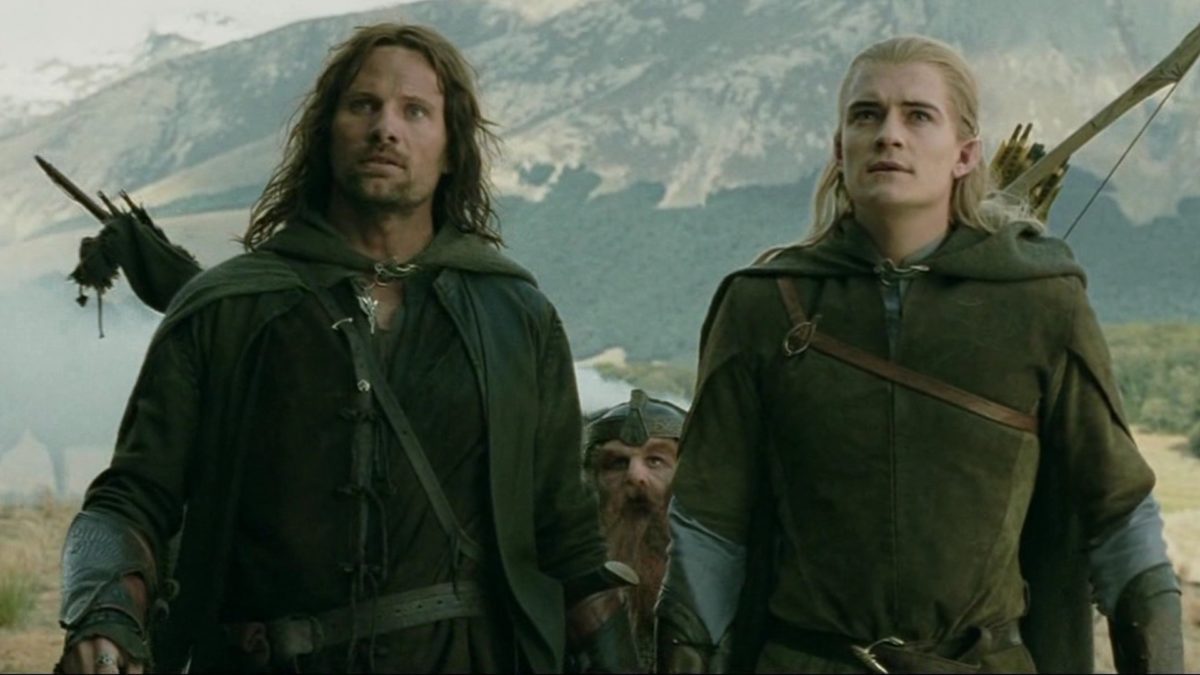Wait, Are ‘The Lord of the Rings’ Movies Christmas Films?

I was shopping for Lord of the Rings-themed Christmas merch the other day because my best friend needs a Gollum tree topper. You know, as one does. And in my online travels, I discovered that there are many folks who consider Peter Jackson’s famed Tolkien trilogy part of the Christmas movie genre. Yes, I was just as surprised as you are. Let’s dig in, shall we?
When I first saw this claim, I assumed it was an extension of the “Is Die Hard a Christmas movie?” debate that the internet rehashes every year. I understand the desire to curate a set of holiday movies to watch that don’t actively suck. Look, there are about three good actual Christmas movies* and they’re all versions of A Christmas Carol. I said what I said. But Die Hard is at least set during Christmas (and features themes of family togetherness, etc.), while The Lord of the Rings takes place in a world where Christmas, as well as Jesus and his Dad, don’t even exist. And unlike the famously terrible Star Wars Holiday Special (which is as gloriously horrible as you can imagine, drinking game at the link!), there’s no lazily constructed Christmas with the serial numbers filed off holiday** shoved in to take its place. If there’s no Christmas anywhere in the movie, not even a substitute version ordered from Wish, then how can it possibly count as a Christmas film?
Don’t worry, there’s a hardcore fanbase that believes The Lord of the Rings trilogy are Christmas movies, and they will be happy to tell you exactly why!
First off, the film features a cast of elves. This seems spurious to me because there’s elves and then there’s elves you know? It’s a pretty broad category of supernatural beings and even proponents of this argument will acknowledge that the elves of Middle Earth and the elves of Santa’s workshop are clearly not the same. I don’t think the idea that hobbits could fill in for traditional Santa-style elves, offered up by Gabriella Paiella at GQ, holds any weight either. Sure, they’re short, apple-cheeked, and distressingly cheerful, but they’re not elves, they’re hobbits. It’s just not the same thing. And more importantly, there’s no Santa. This isn’t C. S. Lewis here, this is J. R. R. Tolkien, and he could keep his analogies internally consistent, thanks.
Next, we’ve got the more feels-based arguments which, to be honest, I’m kind of here for. Christmas is a time for fellowship, for family (found or otherwise), and for thinking of others and making the world a better place. And you can’t argue that The Fellowship of the Ring doesn’t have all of that in spades. Risking everything and suffering so much to destroy the One Ring and make Middle Earth safe bonds the Fellowship together as a family (which three out of four hobbits already were). As others have pointed out, there are some truly lovely, toxic masculinity-free moments of comfort and affection between the fellowship that hit some Christmas movie-themed notes.
Sure, traditional Christmas movies feature fewer deaths in combat and abductions by orcs. Plus, there’s Bilbo’s birthday party at the beginning, which personally feels more like Guy Fawkes Night to me (autumnal, fireworks, eating outside, etc.) Still, I buy the argument that it adds to the overall festive vibes. Honestly, though, all of this is making me lean toward “The Lord of the Rings series are Thanksgiving movies”, even though that’s not a holiday we celebrate in the UK. To quote Jeremy Gordon over at Polygon, “The films take place in fall climates and the food is excellent and some cousins get stoned.” I’m told this truly encapsulates the Thanksgiving experience, especially if you add in fighting some racist uncles at the midway point. The forces of Saruman probably make quite a good stand-in there. Sure, you can fight racist uncles any time of year, but that’s not a point against it having more of a Thanksgiving vibe.
There are actually quite a lot of uncles in the Lord of the Rings, as well as a rehashing of both familial and generational trauma. The ruling families of Gondor and Rivendell are messy, okay? And while family drama is quite Christmasy, in deeply unfortunate ways, this is yet another component that can apply to any holiday or family gathering. Sure, people fight and families experience crises, but it’s usually more seemly and easily resolved than either royal house’s chaos was.
But then we get to the actual Christianity that Tolkien himself inserted into the work. I must concede here that perhaps The Lord of the Rings movies do actually count as Christmas films, much in the same way that The Chronicles of Narnia does. Writing to a friend sometime after publication, Tolkien said The Lord of the Rings “Is, of course, a fundamentally religious and Catholic work; unconsciously so at first, but consciously in revision.” This suggests that his decision to have the Fellowship set off on December 25 was in fact very intentional, and makes the films Christmas movies by default. I’d somehow managed to miss this when reading/watching the source material as a teen. I’m going to have to concede that Paiella is right about all the Christian imagery, from Frodo’s bearing the burden of the ring to Gandalf’s resurrection. Not only are The Lord of the Rings Christmas movies, they’re religious Christmas movies, and I’m going to have to sit with that paradigm shift for a while.
Also, they have snow. Snow is Christmasy!
*I’m not including Christmas-themed horror movies and ghost stories in my general disdain for Christmas movies here. Christmas horror movies are, as a rule, very very good, even when they’re terrible.
**In Tolkien’s books, there is the winter celebration known as Yule, but it isn’t portrayed in the films.
(featured image: New Line Cinema)
Have a tip we should know? [email protected]
